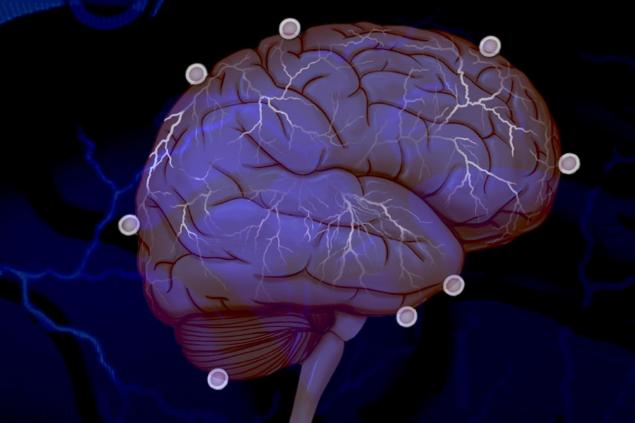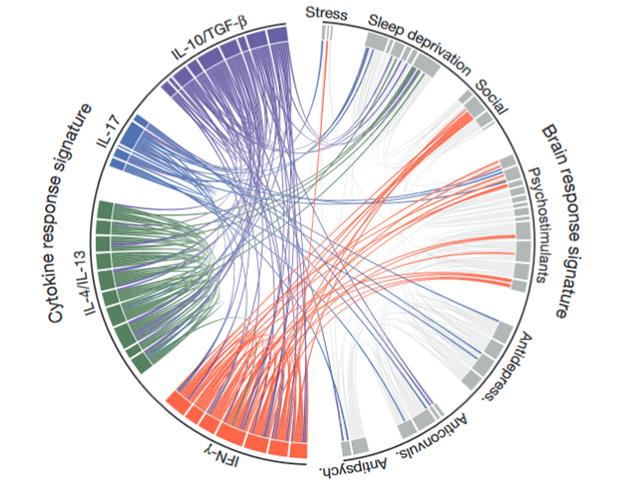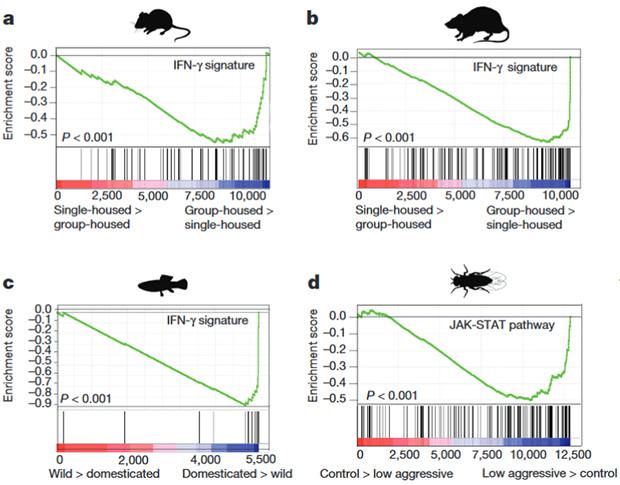584
Immunity, as a regulator of social behavior
According to a recent joint experiments conducted by researchers from the laboratory of the University of Virginia and Massachusetts, the immune system is directly involved in the regulation of neural connections and social behavior. A detailed report on the work and findings of scientists published in Nature magazine.

In its work, the specialists used mice with congenital severe combined immunodeficiency (acquired immune system defeat). The standard three-chamber test of socialization such animals, in contrast to the healthy, interested relatives to the same extent as the surrounding inanimate objects. This anxiety manifestations, motor or mouse olfactory deficits practically demonstrated.
Carried out in the rest state fMRI has identified in immunodeficient mice dramatically increased the number of neural connections between multiple areas of the frontal cortex and the insular gyrus, responsible for social behavior. A very similar pattern is observed in animals with a model social disorders and people with autism spectrum disorders.
At the age of four weeks the mice with immunodeficiency entered normal T lymphocytes. After a further four weeks of such animals in the test "socialization" did not differ from healthy. Normalize the relevant brain regions and neural connections.
Introduction of a healthy animal of antibodies to integrin VLA4, preventing the penetration of T-lymphocytes in the meninges, on the contrary, they have caused a breach of "socialization", similar to the behavior of immunodeficient mice.
To understand exactly what signaling pathways dependent on T lymphocytes (gamma-interferon, interleukins 4/13, 17 and 10, transforming growth factor beta) determine social behavior, the researchers analyzed the representation of the functional groups of genes (GSEA) in 41 transcriptome bark the brain of rats and mice after exposure to a variety of stimulating factors, including social aggregation, sleep deprivation, stress, administration of stimulants, antidepressants, anticonvulsants and antipsychotics. As it turned out, when the social aggregation and taking psychostimulants enhanced expression of genes regulated by interferon-gamma.

Communication cytokine expression with a variety of stimuli. Anthony J. Filiano et al, Nature, 2016
In further experiments it was found that in mice with deficiency of this neurotransmitter immunity observed the same social disorders and neural connections, as in immunodeficient mice. The introduction of interferon-gamma in cerebrospinal fluid can eliminate these violations. The researchers were also able to find out that the neurons of the prefrontal cortex express receptors for interferon-gamma, and the suppression of the expression leads to disorders of social behavior.
Experiments with freshly prepared samples of neurons showed an interferon-gamma inhibits the activity of neurons by increasing the level of inhibitory neurotransmitter GABA. This means that in immunodeficiency disorders of socialization are the result of excessive activation of the prefrontal cortex cells.
Given that interferon-gamma - one of the major mediators of the immune response, the researchers suggested that a double of his action was the result of an evolutionary need to improve the appearance of immunity in relatives of a society where the spread of pathogens takes place rapidly. To test the hypothesis, the researchers analyzed are publicly available transcriptome from different species, including rats, mice, fish, zebrafish and fruit fly. GSEA revealed that all the animals being in close community activates immune mechanisms, even in the absence of infections, and the insulation, on the contrary, leads to suppression.

Communication socialization and expression of cytokines in mice, rats, fish zebrafish and fruit fly. Anthony J. Filiano et al, Nature, 2016
Thus, the experiments and the results led to the surprising conclusion that the immune system is an important regulator of social behavior, and a number of behavioral traits could well emerge in the process of evolution, as a result of combat immunity against infections. "It sounds crazy, but perhaps we are the only multicellular battlefield two ancient forces: the pathogens and the immune system. Part of our personality can actually be controlled by the immune system, "- said the head of the work Jonathan Kipnis (Jonathan Kipnis).
The results may have a significant impact on the understanding of the causes of autism spectrum disorders and schizophrenia, as well as finding new ways and approaches to the treatment of these conditions.
Source
That's all, you had Dronk.Ru. Do not forget to return the money for purchases in China and to subscribe to our blog, will be much more interesting

Recommended:. B>
- Save up to 8% with each purchase on AliExpress and other online stores
China - Why do online shops give the money for the purchase
? - Return the money - Choosing a cashback service to Aliexpress
- History of Dronk.ru - the choice quadrocopters to return the money for buying on AliExpress, and not only
- The best cashback service or 5 main evaluation criteria cashback service
Source: geektimes.ru/company/dronk/blog/278466/

In its work, the specialists used mice with congenital severe combined immunodeficiency (acquired immune system defeat). The standard three-chamber test of socialization such animals, in contrast to the healthy, interested relatives to the same extent as the surrounding inanimate objects. This anxiety manifestations, motor or mouse olfactory deficits practically demonstrated.
Carried out in the rest state fMRI has identified in immunodeficient mice dramatically increased the number of neural connections between multiple areas of the frontal cortex and the insular gyrus, responsible for social behavior. A very similar pattern is observed in animals with a model social disorders and people with autism spectrum disorders.
At the age of four weeks the mice with immunodeficiency entered normal T lymphocytes. After a further four weeks of such animals in the test "socialization" did not differ from healthy. Normalize the relevant brain regions and neural connections.
Introduction of a healthy animal of antibodies to integrin VLA4, preventing the penetration of T-lymphocytes in the meninges, on the contrary, they have caused a breach of "socialization", similar to the behavior of immunodeficient mice.
To understand exactly what signaling pathways dependent on T lymphocytes (gamma-interferon, interleukins 4/13, 17 and 10, transforming growth factor beta) determine social behavior, the researchers analyzed the representation of the functional groups of genes (GSEA) in 41 transcriptome bark the brain of rats and mice after exposure to a variety of stimulating factors, including social aggregation, sleep deprivation, stress, administration of stimulants, antidepressants, anticonvulsants and antipsychotics. As it turned out, when the social aggregation and taking psychostimulants enhanced expression of genes regulated by interferon-gamma.

Communication cytokine expression with a variety of stimuli. Anthony J. Filiano et al, Nature, 2016
In further experiments it was found that in mice with deficiency of this neurotransmitter immunity observed the same social disorders and neural connections, as in immunodeficient mice. The introduction of interferon-gamma in cerebrospinal fluid can eliminate these violations. The researchers were also able to find out that the neurons of the prefrontal cortex express receptors for interferon-gamma, and the suppression of the expression leads to disorders of social behavior.
Experiments with freshly prepared samples of neurons showed an interferon-gamma inhibits the activity of neurons by increasing the level of inhibitory neurotransmitter GABA. This means that in immunodeficiency disorders of socialization are the result of excessive activation of the prefrontal cortex cells.
Given that interferon-gamma - one of the major mediators of the immune response, the researchers suggested that a double of his action was the result of an evolutionary need to improve the appearance of immunity in relatives of a society where the spread of pathogens takes place rapidly. To test the hypothesis, the researchers analyzed are publicly available transcriptome from different species, including rats, mice, fish, zebrafish and fruit fly. GSEA revealed that all the animals being in close community activates immune mechanisms, even in the absence of infections, and the insulation, on the contrary, leads to suppression.

Communication socialization and expression of cytokines in mice, rats, fish zebrafish and fruit fly. Anthony J. Filiano et al, Nature, 2016
Thus, the experiments and the results led to the surprising conclusion that the immune system is an important regulator of social behavior, and a number of behavioral traits could well emerge in the process of evolution, as a result of combat immunity against infections. "It sounds crazy, but perhaps we are the only multicellular battlefield two ancient forces: the pathogens and the immune system. Part of our personality can actually be controlled by the immune system, "- said the head of the work Jonathan Kipnis (Jonathan Kipnis).
The results may have a significant impact on the understanding of the causes of autism spectrum disorders and schizophrenia, as well as finding new ways and approaches to the treatment of these conditions.
Source
That's all, you had Dronk.Ru. Do not forget to return the money for purchases in China and to subscribe to our blog, will be much more interesting

Recommended:. B>
- Save up to 8% with each purchase on AliExpress and other online stores
China - Why do online shops give the money for the purchase
? - Return the money - Choosing a cashback service to Aliexpress
- History of Dronk.ru - the choice quadrocopters to return the money for buying on AliExpress, and not only
- The best cashback service or 5 main evaluation criteria cashback service
Source: geektimes.ru/company/dronk/blog/278466/























